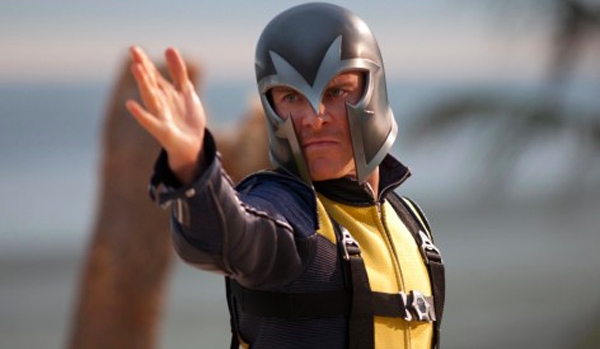I've been watching X-Men: First Class on pay cable a lot recently. It's such a fun, breezy, well-put-together X-Men movie. My only real problem with it — the one that pricks and pokes at my nerd brain every time I watch — is the way the film attempts to connect continuity-wise with FOX's earlier X-Men films … but only in certain cherry-picked aspects. So it's not in full continuity with the other movies. It's only in partial continuity. Some examples: Hugh Jackson drops in for a cameo as Wolverine. Jennifer Lawrence's Mystique briefly shape-shifts into the Rebecca Romijn version of the character from the previous films. Certain recognizable props like Cerebro and Magneto's helmet have their origin stories told in First Class. These are all things meant to convey that First Class, which was produced by X-Men and X2 director Bryan Singer, exists in the same universe as the other X-films. Okay, fine. But then other parts of the movie toss X-continuity aside completely. Young Xavier becomes paralyzed at the end of this film despite the fact that an older Xavier is seen walking around just fine during flashback scenes in X-Men: The Last Stand. The origin story for Cerebro actually doesn't match up too well with what we're told about the machine in the first two X films. X-Men Origins: Wolverine is basically ignored entirely. ("Screw that version of Emma Frost!" says First Class.) There's lots of murkiness involving the ages of Xavier and Magneto and discrepancies over when they met. And what's the deal with Alex Summers? In the comics, he's Scott Summers' brother. But here, with the wonky timeline … who knows? It's never explained. Alex is just some dude who has the same last name of The Man Who Would Be Cyclops, I guess. The whole thing makes my head hurt and adds unnecessary complications to a film that doesn't need them. Partial continuity forces me to spend time puzzling over discrepancies rather than focusing on the movie's strengths.
First Class isn't the only recent film that's gone this route. Singer's own Superman Returns is another, and it was hurt far worse by its sometimes slavish/sometimes cavalier devotion to earlier films. In general, Returns attempts to serve as an official sequel to Superman: The Movie and Superman II while ignoring III and IV. (Employing partial continuity is apparently the favored approach for those who want to build off the good movies in a series while ignoring the shitty ones.) That plan was risky but acceptable, as I and II are the only Chris Reeve Supermans that anyone gives a damn about. So in Superman Returns, we get a repeat performance by a dead Marlon Brando as Jor-El and a smorgasbord of other direct callbacks to those films (the Addis Ababa meteorite, etc.). But then, unfortunately, the introduction of Superman's kid sends everything askew. Let's not forget, Supes gives Lois a big ol' amnesia kiss at the end of Superman II, making her forget all about the events of that movie including the couple's passionate, silver-pillow-accentuated love affair. So when Lois pops out a kid between II and Returns … what? Did she assume it was somebody else's? Was she sleeping with anyone else at the time? And when the kid turned out to have super-strength, was her first thought, "Wait … did Superman slip me a roofie and have his way with me while I slept?" Is it a nerdy nitpick? Maybe. But this is what I obsess over when filmmakers choose to go with partial continuity. Singer is the one who decided to incorporate some but not all of the events of Superman II in his movie, so he's got no one to blame but himself when I start wondering whether Lois wonders if Superman raped her. Not to mention that one could argue Superman Returns may have been a much better film had Singer been more concerned with making a great stand-alone Superman movie than he was with making a great sequel to a pair of decades-old films.
Singer isn't the only one who likes to play the partial-continuity game. Terminator: Salvation mostly follows the first three Terminator films but mucks with the established timeline some. Rise of the Planet of the Apes lines up pretty well with the original Charlton Heston-starring film but ignores pretty much everything that came after. The Thing '11 serves as a prequel to The Thing '82 but takes a few liberties. Star Trek '09 uses time-travel to be a reboot and an in-canon Trek sequel at the same time (and then uses "altered timeline!" as an excuse any time it wants to veer off-course). Some of these movies do better than others at connecting with past films without fully committing to being in continuity with them. I'm not saying it can't successfully be done, but I am saying that it's usually unwise to attempt it.
So here's what I want: No more partial continuity in movies. Either reboot entirely or put the extra effort into making sure your new film lines up properly and completely with what came before. It's trying to take the middle ground that creates problems. Ultimately, a studio's primary concern should be that the film being made is as good as it can be. Strong continuity can indeed augment individual movies in a given series by providing character depth and enriching themes that have slowly developed over multiple films. But once you reach the point where sticking to continuity becomes more of a burden than a bonus (which often happens as soon as you go the prequel route), the screenwriter(s) and director are better served by dropping continuity entirely and focusing on making a good stand-alone film. X-Men: First Class, as entertaining as it is, would likely be even better if it didn't try to awkwardly glob onto the earlier movies. So let's let sequels be sequels and reboots be reboots. It's way too easy for anything stuck in the middle to become a narratively unsatisfying jumble.












